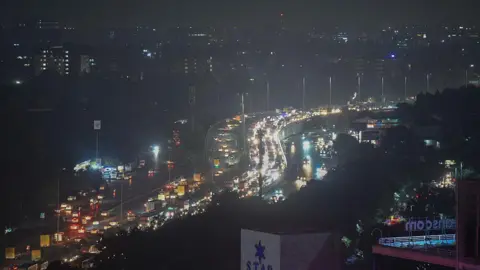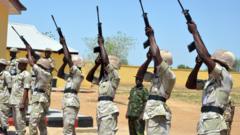As the conflict over language and identity continues to boil in India’s richest state, Maharashtra, the situation has escalated to alarming levels. The turmoil began in April when the Maharashtra government mandated that state-run primary schools include Hindi as a third language, along with English and Marathi, which is the primary language of the state. This directive was framed as part of a broader national educational policy aimed at promoting multilingualism among schoolchildren.
Opposition arose from various civil society factions, language advocates, and political entities who criticized the government's decision as an attempt to impose Hindi — primarily used in northern and central India — over the local linguistic identity. The issue is particularly sensitive in Maharashtra, where the dominant language is linked to regional pride and cultural heritage. Historical grievances regarding language have seen similar protests; for instance, last year in Bengaluru, activists demanded that signs be primarily in Kannada.
Since the Bharatiya Janata Party (BJP) took office in 2014, apprehension towards Hindi has been amplified, particularly as migrant influx from Hindi-dominant states worries regions that pride themselves on their local tongues.
In light of mounting tensions, the Maharashtra government suspended the controversial language policy and appointed a committee to reassess the situation. Despite these moves, civic unrest persists, especially with municipal elections on the horizon. The political landscape has become a battleground for the ruling coalition and its rivals, each accusing the other of exploiting the language issue for electoral advantage.
A wave of violence has arisen against non-Marathi speakers amid these protests, reflecting escalating societal divisions. Recent incidents include assaults on individuals speaking in non-Marathi languages, which have been widely circulated on social media, resulting in public outrage.
Remarkably, this language dispute has led to a rare collaboration between arch-rivals Uddhav Thackeray, leader of Shiv Sena (UBT), and Raj Thackeray, head of the Maharashtra Navnirman Sena (MNS), as they organized joint protests to oppose perceived Hindi encroachments. Political observers noted that such cooperation, aimed at rallying Marathi pride, could influence outcomes in the upcoming municipal elections.
While citizens hold a strong attachment to their linguistic heritage, critiques abound regarding the growing extremism of identity politics. Editorials have cautioned against inflammatory regionalism, emphasizing that it fosters an environment ripe for violence—an unsuitable consequence for a state known for its economic vibrancy. Observers suggest that the long-term sustainability of political support for aggressive language-based campaigns remains uncertain, as constituents increasingly prioritize effective governance and job creation over divisive identity politics.
Opposition arose from various civil society factions, language advocates, and political entities who criticized the government's decision as an attempt to impose Hindi — primarily used in northern and central India — over the local linguistic identity. The issue is particularly sensitive in Maharashtra, where the dominant language is linked to regional pride and cultural heritage. Historical grievances regarding language have seen similar protests; for instance, last year in Bengaluru, activists demanded that signs be primarily in Kannada.
Since the Bharatiya Janata Party (BJP) took office in 2014, apprehension towards Hindi has been amplified, particularly as migrant influx from Hindi-dominant states worries regions that pride themselves on their local tongues.
In light of mounting tensions, the Maharashtra government suspended the controversial language policy and appointed a committee to reassess the situation. Despite these moves, civic unrest persists, especially with municipal elections on the horizon. The political landscape has become a battleground for the ruling coalition and its rivals, each accusing the other of exploiting the language issue for electoral advantage.
A wave of violence has arisen against non-Marathi speakers amid these protests, reflecting escalating societal divisions. Recent incidents include assaults on individuals speaking in non-Marathi languages, which have been widely circulated on social media, resulting in public outrage.
Remarkably, this language dispute has led to a rare collaboration between arch-rivals Uddhav Thackeray, leader of Shiv Sena (UBT), and Raj Thackeray, head of the Maharashtra Navnirman Sena (MNS), as they organized joint protests to oppose perceived Hindi encroachments. Political observers noted that such cooperation, aimed at rallying Marathi pride, could influence outcomes in the upcoming municipal elections.
While citizens hold a strong attachment to their linguistic heritage, critiques abound regarding the growing extremism of identity politics. Editorials have cautioned against inflammatory regionalism, emphasizing that it fosters an environment ripe for violence—an unsuitable consequence for a state known for its economic vibrancy. Observers suggest that the long-term sustainability of political support for aggressive language-based campaigns remains uncertain, as constituents increasingly prioritize effective governance and job creation over divisive identity politics.






















